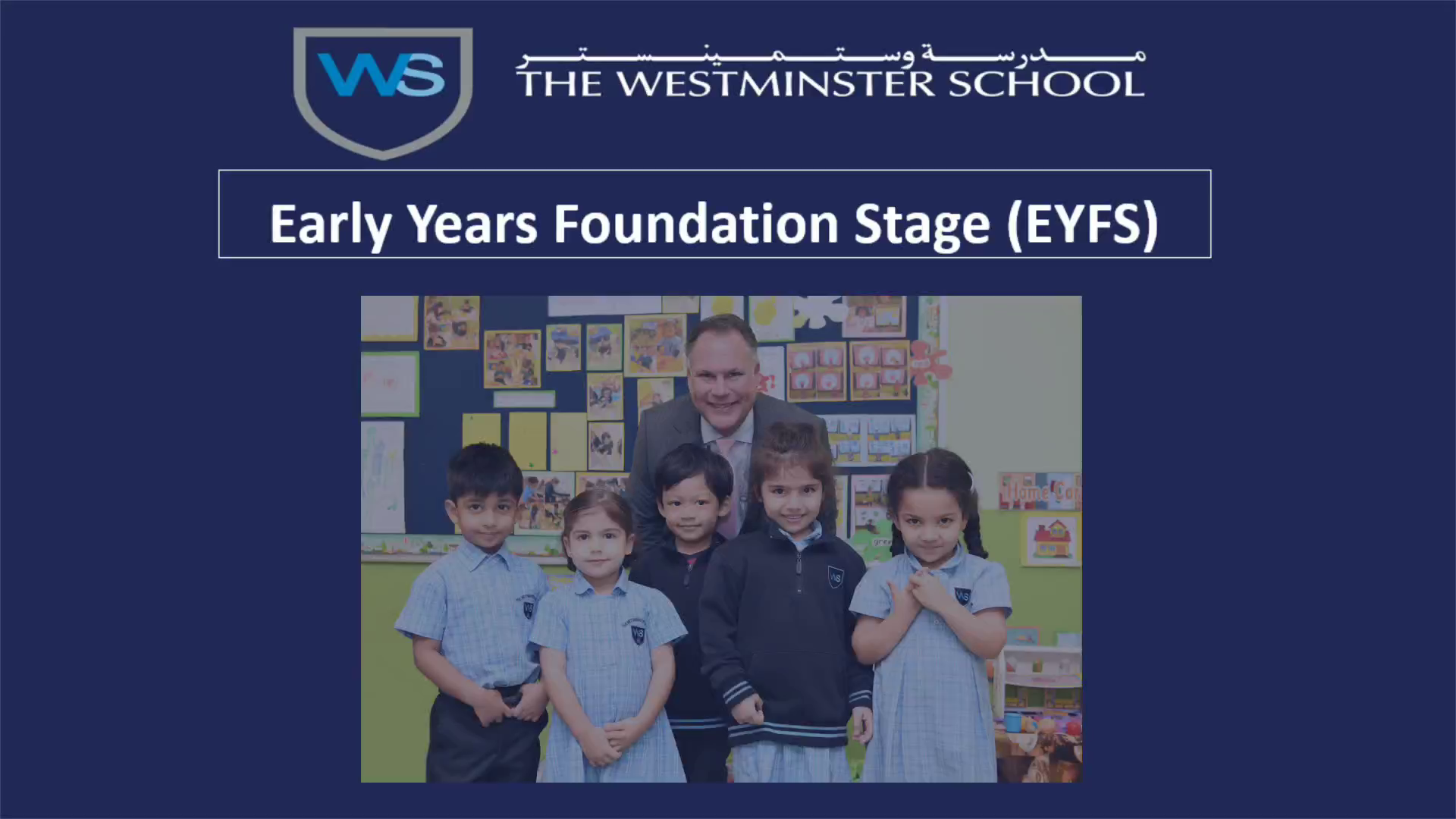
Page 1 (0s)
[Audio] Early Years Foundation Stage (EYFS). Early Years Foundation Stage (EYFS).
Page 2 (9s)
[Audio] Objective of the learning module To understand about the Early Years Foundation Stage The Early Years at the Westminster School, Dubai The themes and principles in the Early Years. The different areas of learning and the aspects. The Early Years Foundation Stage curriculum. Assessment in the Early Years. Planning in the Early Years. Important Links.
Page 3 (40s)
[Audio] Early Years Foundation Stage (EYFS) at the Westminster School Early Years 3-5 years Foundation Stage1 & 2 Fun Filled Learning Positive Attitude Safe and Secure Happy Environment.
Page 4 (1m 4s)
[Audio] The Themes and Principles that work together for children in the EYFS. A Unique Child(Every child is a unique child who is constantly learning and can be resilient, capable, confident and self-assured) + Positive Relationship(Children learn to be strong and independent through positive relationships) + Enabling Environments(Children learn and develop well in enabling environments, in which their experiences respond to their individual needs and there is a strong partnership between practitioners and parents and carers.) = Learning and Development(Children develop and learn in different ways. The framework covers the education and care of all children in early years provision, including children with special educational needs and disabilities. Practitioners teach children by ensuring challenging, playful opportunities across the prime and specific areas of learning and development.).
Page 5 (2m 3s)
[Audio] What is the EYFS Framework – why do we have one? The Unique Child reaches out to relate to people and things through the Characteristics of Effective learning. Playing and Exploring Active Learning Creating and thinking critically Children develop in the context of relationships and the environment around them. This is unique to each family, and reflects individual communities and cultures. Prime areas are fundamental, work together, and move through to support development in all other areas. Personal, Social and emotional development. Communication and language Physical development Specific areas include essential skills and knowledge for children to participate successfully in society. Literacy Mathematics Understanding the world Expressive arts and design.
Page 6 (3m 8s)
[Audio] Prime Area Personal , Social and Emotional Development Self Regulation Managing Self Building Relationships Physical Development Gross Motor: Consideration for others when moving around Strength and balance. Specifically talks about Jumping, running, dancing, hopping, skipping and climbing. Fine Motor: Use of tripod grip Tools specified – focus on cutlery – Scissors 'accuracy and care when drawing Communication and Language Listening & Attention Understanding Speaking.
Page 7 (4m 1s)
[Audio] Specific Area Literacy Comprehension Demonstrate understanding of what has been read to them by retelling stories and narratives using their own words are recently introduced vocabulary. Anticipate – where appropriate – key events in stories. Use and understand recently introduced vocabulary during role-play and in discussions about stories, non-fiction, rhymes and poems. Mathematics Number Have a deep understanding of number to 10, including the composition of each number Subitize (recognize) quantities without counting. Automatically recall (without reference to rhymes, counting or other aids) number bonds up to 5 (including subtraction facts) and some number bonds to 10, including double facts. Numerical pattern Verbally count beyond 20, recognising the pattern of counting system. Compare quantities up to 10 in different context, recognising when one quantity is greater than, less than or the same as the other quantity. Explore and represent patterns within numbers up to 10, including evens and odds, double facts and how quantities can be distributed equally..
Page 8 (5m 24s)
[Audio] Specific Area Understanding the world People, Culture and Communities. The Natural World Expressive Art & Design Creating with Materials Children at the expected level of development will: safely use and explore a variety of materials, tools and techniques, experimenting with colour, design, texture, form and function; share their creations, explaining the process they have used; Being Imaginative and Expressive Children at the expected level of development will: invent, adapt and recount narratives and stories with peers and their teacher; sing a range of well-known nursery rhymes and songs.
Page 9 (6m 16s)
[Audio] Observation, Assessment and Planning in EYFS Start Here Observation. Look, listen and note. Describing Assessment. Analyzing observations and deciding what they tell us about children, Planning. What's next? Experiences and opportunities, learning environment, resources, routines, practitioner's role..
Page 10 (6m 49s)
[Audio] For further information about early years, below are some useful links.
Page 11 (7m 11s)
[Audio] Thank You. THANK YOU.